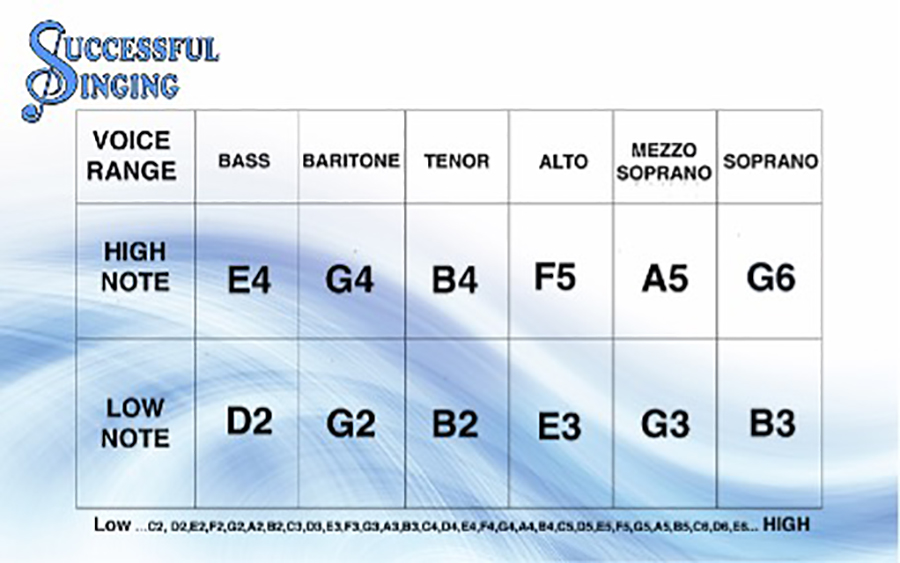Find Your Vocal Range
Find Your Vocal Range
Every singer would like to know what their voice type is. We have created an easy to use video to help you discover what range you sing in. With an explanation on how to use the video, followed by an explanation about your range and what it means
How To Use The Video
On screen you will see a code appear each time the note changes. Eg G3. These codes represent the notes being played on the piano, and at what octave. Simply hum or sing ‘la’ along to each note that you can comfortably sing. Firstly we will find your lowest note, then we will find your highest note
Please note that the range of notes played in this exercise are vast and you probably will not be able to sing all of them. Guys you may find you will be able to sing more of the lower section of the exercise whereas ladies, you may be able to sing along to more of the higher notes of the exercise. You may also find that your highest and your lowest note is just within the one section.
Find Your Lowest Note
This section starts at middle C on the piano, and goes down the scale. Join in where you can, and when you reach the note that you feel is your lowest comfortable note. Write down the code. If the higher notes at the start of the exercise are too high for you, make a note of the code you feel you are able to join in with – this will be your highest notes, then record the code at the lowest note you are able to reach.
If you struggle singing the low notes, don’t worry as your starting note might be in the higher section.
Find Your Highest Note
This section starts again at middle C on the piano, but this time it goes up the scale. Join in where you can and when you reach the highest note that is comfortable to sing. Write down the code
You may well have found your highest note in the previous section, or you find you have a code from both the Low Voice and a code from the High Voice sections.
You should now have to sets of codes
For example, you may have a G3 – D5 set of codes.
Compare them to the chart below to give you an idea of what range you sing in. The codes within the chart are the range of notes a person of that voice range would usually sing. Choral or classical music will usually write music within these note ranges.
You may end up with codes very much outside of the parameters of the ranges suggested in the graph below. Eg your range goes from G3 (Baritone through to G5 (Mezzo) More about this is explained further down the page

An Explaination Of The Different Voice Ranges

Female Voice Ranges
Alto or contralto.
This is the lowest female voice range. generally very similar to the male tenor range – from F below middle C to a high D (F3-D5). In choral work, altos generally support the harmony to the soprano’s melody.
Famous Pop alto singers include Adele, Alison Moyet, Shirley Bassey and Patsy Cline.
Mezzo Soprano
The middle range and most common of the female voice, generally ranging from G below middle C to high A (G3-A5) In choral music, Mezzo’s usually sing along with the sopranos, although sometimes, soprano parts may be split into two and the mezzos will take the Soprano 2 part.
Famous pop mezzo-sopranos include Beyonce, Dusty Springfield, Leona Lewis
Soprano
The highest female voice range, generally ranging from middle C4 above Top C6: (this is a conservative range estimate for a professional singer. A true soprano can often reach a top E or even higher). In choral music, the soprano’s often get the melody line.
Famous pop sopranos include Kate Bush, Sarah Brightman and Dolly Parton.4

Male Voice Ranges
Bass
This deepest male voice, generally ranging from a low C, two octaves below middle C to E above middle C (C2-E4). In Choral basses may have rather monotone harmonies. In opera, basses probably have the greatest range of roles.
Famous Bass singers include Nat King Cole and Louis Armstrong.
Baritone
The middle range for the male voice, and is the most common of the male singing voices.. It ranges from the second G below middle C to the F above (G2-F4).
Most male pop singers sing within this baritone range.
Tenor
This is the highest of the male voices, with a vocal range of C below middle C to G above middle C (C3-G4). In Opera, the Primo Uomo (principle male) is most often a tenor.
Famous pop tenors would include Michael Jackson, Phil Collins and Freddie Mercury.
Counter Tenor
This is one of the most rarest of male voices. A true countertenor is a male singer who can sing as high as soprano, without using falsetto. However many singers who sing in the counter tenors have developed a very strong and powerful falsetto. Counter Tenors were highly prized in 16th Century church music and many boys underwent castration to prevent their voices from breaking. They were know as Castrato and the last know was Alessandro Moreschi who died in 1922. Here’s a recording of him.
I’ve got codes that are outside the singing ranges suggested
According to your chart, I have a Baritone, Tenor, Alto and Mezzo all-mixed-into-one range … so what am I?
The suggested guidelines for the above singing ranges are standardised. Music written for eg. a Bass singer will be written within this range of notes, Soprano’s in that range of notes. Many of you will find that you have a range beyond these standard ranges. This is completely normal. If you are comfortable singing within a particular range, then stick with it.
However, there are other factors which will determine your voice range. Depending on what genre of music you sing, or even the role you take in more classical pieces, your singing teacher, choir or music director may point you into the direction of a different range. For example: You can sing within the soprano range and can hit all the high notes, but you may be pointed to the Mezzo range or they feel you are more suited to an Alto range.
Why?
There are different characteristics with your voice, which, alongside your singing range which also factor in determining your voice type:
- ·Range – the notes your body can produce
- ·Weight – light voices, bright and agile; heavy voices, powerful, rich, and darker
- ·Tessitura – part of the range which is most comfortable to sing
- ·Timbre – unique voice quality and texture
- ·Transition points – points where you change from chest, to middle, to head register
- ·Vocal registers – how extended each register is
- ·Speech level – speaking range
- ·Physical characteristics
Vocal tessitura and timbre can be more important than range, especially in the case with sopranos and mezzo-sopranos; They might have the same range of notes, but a soprano will sound brighter and lighter, whereas a mezzo-sopranos would have a lower tessitura and darker timbre.
Something else to mention, especially in the pop genre. Singers have what are called ‘Money Notes’. This is what the singer has become famous for (eg Mariah Carey’s whistle pitch, Celine Dion’s high notes in full voice) part of the song, which the singer’s voice can being out the most emotion or dramatic part of the song, or they may have a challenging technique or reach high notes that are difficult to sing, It all helps sell tickets or albums, for which the singer becomes well-known for, but it may not always sit within traditional voice ranges.

